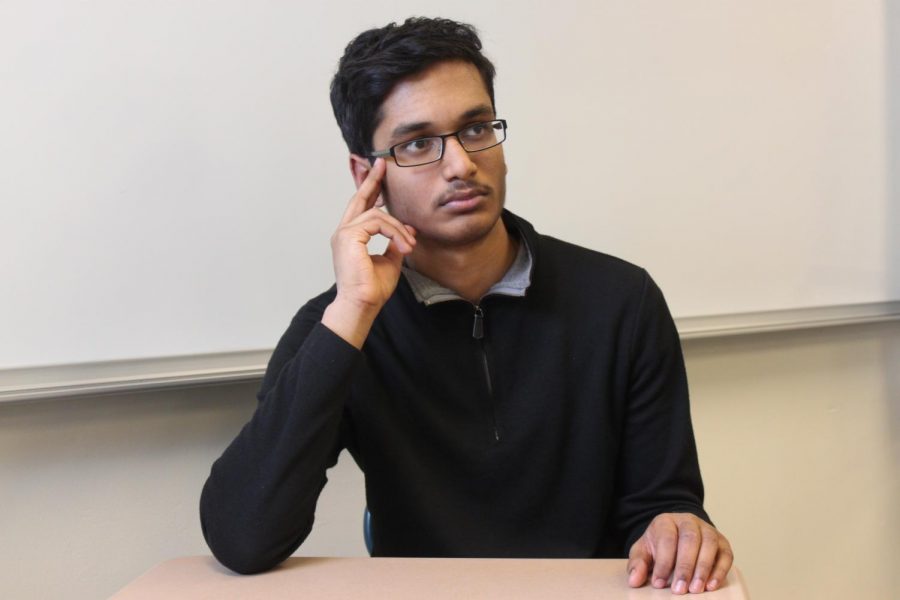The grey matter
A world through a pink lense
Photo by Photo by Sreelikhi Vangavalou
Our community influences the way we make decisions from a young age yet the decision making process during teenage years is purely a neurological science.
As students face a whirlwind of pressures throughout their high school careers, some are finding that hard work and dedication are not enough to get them through.
These pressures influence high schoolers in a variety of ways, including the decisions they make. A study conducted by Journal of Experimental Psychology, an academic journal published by American Psychological Association, explored how different age groups make decisions. The findings were clear: the different avenues that teens receive information from constantly influence the way in which teens act.
From peer pressure academically to societal pressure on social media, the decision a young brain makes of one idea over another is constantly being swayed by the environment they are surrounded by.
Social media Stress:
Scrolling through a countless number of pictures, agonizing over what to post next and figuring out the perfect words to tweet are common actions teens perform nowadays. But is all that scrolling and tapping of social media linked to the pressure and stress that over 66 percent (according to childmindinstitute.com) of adolescents face?
There is a correlation between time spent scrolling through social media apps and a devolving a negative body image. “Those who spend more time on social media had two times the risk of reporting eating and body image concerns, compared to their peers who spent less time on social media,” according to a 2016 study from the University of Pittsburgh.
But the problem lies deeper than social media’s influence on self image. With so much pressure to “be good enough,” adolescents feel pressured to put their best selves out into the world. That pressure often causes teens to indulge in poor decision-making.
“The need to gain likes on social media can cause teens to make choices they otherwise would not make, including altering their appearance, engaging in negative behaviors, and accepting risky social media challenges,” Katie Hurley, therapist and writer from psycom.net, said. “Though many teens know that their peers share only highlight reels on social media, it is very difficult making comparisons.”
With over 76 percent of people in the US having access to social media, adolescents come face to face not only with their peers, but also with models and celebrities. 62 percent of adolescents feel that social media and celebrities posts have ramped up their expectations over their personal appearance, according to a 2015 survey from the Guardian, a British news and media source.
“Adolescents and people in the early twenties in particular are the years in which you are acutely aware of the contrasts between who you appear to be and who you think you are,” Dr. Donna Wick, clinical and development psychologist, said to the Guardian. “As you get older and acquire more mastery you bring to realize that you actually are good at some things. Self-esteem comes from consolidating who you are.”
A recent study of teens aged 13-18 from the UCLA Brain Mapping Center found that “receiving a high number of likes on photos showed increased activity in the reward center of the brain,” which goes hand in hand with the fact that teens feel good to be liked and herd mentality is big on social media.
Aspiring for Academic Achievements:
Perfect grade point average. Stellar SAT and ACT scores. Taking part in as many as ten clubs and sports outside of school. These are the things that make the world go round for many students in the area, but some say these constant pressures are causing a dilemma.
As stress piles up, professionals say that at a certain point all of these pressures do more harm than good. According to ascd.org, a site that deals with parental education of student issues, this ongoing competition to get into the best college possible can cause serious harm to a student’s mental state.
“A child who is socially skilled, deeply loyal, funny, feisty, caring, and imaginative may never come to value these qualities or see them as anywhere near the core of his or her being,” the website said. In fact, the students who would be friends often become enemies, turning competition, the website said. “They suffer both a diminished sense of others and a diminished sense of themselves.”
This competition can cause deep emotional trauma, especially when students are applying for college, according to Carl Krause, college counselor. When a student measures themself against others and not their personal goals, it can cause unnecessary hardships, Krause says.
“That’s just a horrible way to go through life, because if you keep doing that then you’re never going to be enough. I think it’s already hard for some students who are struggling a little bit to start seeing all their friends getting all of these acceptances and doing all of these classes,” Krause said. “Sometimes they see others can take five AP classes and still sleep eight hours a night, while they are staying up until 2 in the morning and barely get any sleep just to keep even. Not everybody can admit [there is too much pressure], and you have to embrace that individualism as a student and not worry about everyone else. You have to do what’s right for you and what’s safe for you.”
This manipulation of a student’s personality happens often, according to a study from the website. Along with distinct aspects of their personality being diminished, researchers are finding that the stress associated with getting into college can cause mental illness, the website said.
“One study of 144 girls in an affluent northeastern high school revealed that these girls were two to three times more likely to report clinical levels of depression than the general population of teens,” the study said. But even though there are more complex problems that cause illnesses such as depression, “researchers point to a strong association between these troubles and achievement pressures.”
Though this stress may cause mental issues, students all across the country still stress to achieve their best: do well in class, perform some kind of miracle to stand out, get an internship at 15. Though some of these tasks may be exaggerated, professionals say that many students feel they have to put themselves through immense pressure to get into a prestigious college.
The treasured college degree seems to hold such influence among high school students. In fact, according to the 2016 State of Our Nation’s Youth report, an annual survey conducted among high-schoolers and young adults ages 14 through 23, “90 percent of high-school students aspire to complete a college degree or certificate program.”
The Science Behind the Process:
How an adolescent makes a decision in one instance differs from how he/she might make a decision in a more stressful situation, yet how the decision is made is purely a result of neurological science.
The American Association of Child and Adolescent Psychiatry claims that scientists identify the frontal cortex, the area of the brain that controls reasoning and helps us think before we act, as a part of the brain that develops later. Thus, the decisions that a teenager makes in a situation may not be the most logical in the long run because they are not physically capable of making the “perfect” decisions.
The brain development is also highly affected by the social environment that an adolescent encounters in the community from their youth. From a local viewpoint, Trevor Tognetti, sophomore, has seen the impact of the different influences that a teen faces from day to day life in the way people are shaped.
“Having these [different factors of] influence [from family and friends can] makes a person act instinctively which causes social pressure,” Tognetti said. “Yet having a standard way of acting or thinking causes people not to be so authentic. These different influences can cause a lot of pressure for some people.”
In adolescence, a teen’s psychosocial maturity, the relationship between brain development and the risk of making poor choices, particularly during hot situations (abc.net), can also be traced back to neurological developments that teens experience, specifically with dopamine activity within the limbic system.
The ability to think through a problem and come up with long term solutions tend to be harder under such situational pressures because adolescents are less likely than adults to
make use of all available information and rely instead on partial information to make decisions. Adults exhibit greater emotional stability in their decision-making across similar challenging situations and contexts, which is why many students turn to parents for advice during stressful periods.
“Before I make a decision I think [about] what my parents would do and I think about everything they have taught me and I make my decisions based on that,” Daniel Polites, junior, said. “There are moments where I feel stressed out because [my parents] obviously want me to do good in school so it can be a lot of pressure [but] I always have the motivation to do well in my classes.”

After being in the journalism program for three years, Parul will be starting this year as a senior! Outside of the journalism lab, you can find her playing...

As a senior, this is Max’s third year on staff and first year as magazine editor in chief for the Bear Facts program. He aspires to study environmental...

As a senior, this is Sreelikhi's third year on staff and second year as the Spotlight Editor. She is a member of the Varsity Tennis team, a member of the...

